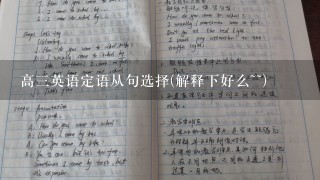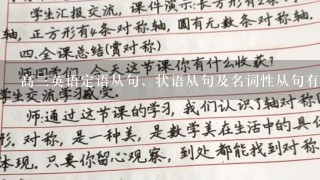2011届高三英语定语从句第一轮复习语法,高三英语定语从句选择(解释下好么~~)

1、2011届高三英语定语从句第一轮复习语法
定义 I. 定语从句起形容词的作用,在句中修饰一个名词或代词。被修饰的词叫做先行词,引导定语从句的词叫关系词,他的作用一是放在先行词与定语从句中间起了连接作用,二是在从句中担当一个成分,并与先行词保持数的一致。 关系词 先行词 从句 成分 例句 备注 关系代词 who 人 主语 Do you know the man who is talking with your mother? whom, which和that在从句中做宾语时,常可以省略,但介词提前时后面关系代词不能省略,也不可以用that whom 人 宾语 Mr. Smith is the person with whom I am working The boy (whom) she loved died in the war.. whose 人,物 定语 I like those books whose topics are about history. The boy whose father works abroad is my desk mate. that 人,物 主语 宾语 A plane is a machine that can fly. She is the pop star (that) I want to see very much. which 物 主语 宾语 The book (which) I gave you was worth $
10、 The picture which was about the accident was terrible. as 人,物 主语 宾语 He is such a person as is respected by all of us. This is the same pen as I lost yesterday. as做宾语一般不省略 关系副词 when 时间 时间 状语 I will never forget the day when we met there. 可用on which where 地点 地点 状语 This is the house where I was born. 可用in which why 原因 原因 状语 I can’t imagine the reason why he turned down my offer. 可用for which Ⅱ. as与which的区别: 定语 从句 区别 例句 限制性定语从句 中 名词前有such和the same修饰时,关系代词用as,不能用which He is not such a fool as he looks. Don’t read such books as you can’t understand. 非限制性定语从句中 as和which都可以指代前面整个主句。如果有“正如,象”的含义,并可以放在主句前,也可以放在后面,那么用as;而which引导的从句只能放主句后,并无“正如”的意思。 They won the game, as we had expected. They won the game, which we hadn’t expected. As is well known, he is a famous film star in the 1980s. Ⅲ. 限制性定语从句与非限制性定语从句的区别: 类别 语法意义及特征 例句 限制性定语从句 对先行词起修饰限制作用,如果去掉,主句意思就不完整明确,这种从句与主句的关系十分密切,写时不用逗号分开。 The accident happened at the time when I left. 非限制性定语从句 对先行词作附加的说明,与主句的关系不十分密切,较松散。从句和主句之间用逗号分开,相当于一个插入语,不能用that引导,关系代词做宾语时也不能省略。 His mother, whom he loved deeply, died ten years ago. 一、考点聚焦
1、功能:相当于形容词,修饰名词或代词,在句中作定语
2、位置:定语从句置于被修饰词之后 Those who are willing to attend the party, sign here please.
3、先行词:被定语从句修饰的词称为先行词 (1)先行词一般是名词和不定代词,如:some-, any-, every-和no与-boy, -thing的合成词;或all、none、any、some、that、those等代词。数词也可以作先行词,人称代词也同样可作先行词。 (2)先行词与关系词是等量关系。必须注意两点: ①先行词在从句中作主语时,从句谓语动词的数由先行词而定。 This is the place which is worth visiting. ②关系词在从句句子中充当了成分,其意思就是先行词的意义,所以在从句中不能重复其意。 There are many places we can visit(them)in China.
4、关系词:引导定语从句的都称关系词 关系代词:who, whom, which, that, whose, as。 关系副词:when, where, why。that偶尔也作关系副词。
5、确定关系词的步骤 (1)先找关系词,看先行词指的是什么。 (2)看关系词在从句中所充当的成分。
6、在定语从句中,当先行词指物时,下列情况的关系词宜用that而不用which (1)先行词被①形容词最高级 ②序数词 ③数词几种词修饰或被 ④only、any、few、little、no、all、one of等修饰时。 (2)先行词为all、much、little、none、few、one、something、anything等不定代词时。 (3)先行词中既有人又有物时。 He was looking pleasantly at te children and parcels that filled his bus. (4)先行词在主句中作表语关系词在从句中作表语时。 The village is no longer the one that was 5 years ago. (5)当主句中含有疑问词which时。 Which are the books that you bought for me ?
7、宜用which而不用that的情况 (1)在非限制性定语从句中 (2)在关系词前有介词时 (3)当先行词本身是that时 (4)当关系词离先行词较远时
8、关系词who与that指人时,也有不同情况分别用不同的关系词 (1)当主句是there be句型时,关系词用who。 (2)先行词是为anyone、those、someone、everyone、one等词时,关系词用who。 (3)当主句是who作疑问词时,关系词用that。 Who is that girl that is standing by the window? (4)whom在从句中只作宾语,可被who取代。
9、whose作关系词既指人又指物,在从句中作定语。如: Do you know Mr. Smith whose story is very moving? There is a room, whose window faces the river. There is a room, the window of which faces the river.
10、关系代词as,在从句中作主语、宾语和表语。 (1)先行词被such和the same修饰,或句型as many(much)中,从句都用as 引导。 Such books as you bought are useful. The school is just the same as it was 10 years age. 注意:区别①such … that … 引导的结果状语从句。They are such lovely children that we love them much .②the same … that … 引导定语从句。I want to use the same tool that you used just now. (2)无先行词的定语从句用as和which引导。 区别:①意义上:as 含有“这点正如……一样”。②位置上:as 从句可置句首,也可在另处。 He didn’t pass the exam, as we had expected. There is lots of air in loose snow, which can keep the cold out. As is known, the earth is round, not flat.
11、关系副词when与where、why、that when 指时间 = in / at / on / during which where指地点 = in / at / from / which why指原因 = for which 当先行词为way、day、reason、time时,可用that作关系副词。(非正式场合) I don’t like the way that / in which / he talks. 当time作先行词时,关系词可以省掉。 This is the first time I have given you a lesson in French.
12、必须注意的问题 (1)关系词作主语时,从句中谓语的数。 (2)注意区别定语从句与强调句。 ①定语从句中关系词作从句成分,复合句。 ②强调it无意义,that / who不是引导词。 ③强调it is / was和that / who后如果句子意思讲得通则是强调句,讲不通则不是。 It is the museum that / which we visited last year.(定语从句) It was in the hotel that we stayed last night.(强调句) (3)定语从句与同位语从句的区别。 ①定语从句引导词被称为关系词,that充当主语、宾语、表语。有时可省略。 ②同位语从句引导词被叫做连词,that不能充当任何成分,不可省。 Word came that their army was defeated.(同位语) We expressed to them our wish that was the same as their.(定语) (4)关系词在从句中省略的情况。 ①关系词作宾语,前无介词时。 ②关系词作表语。 (5)限制性定语从句与非限制性定语从句的翻译。 (6)关系词前有介词或复杂介词,关系词只能是which和whom。 (7)几个特殊的定语从句句型: ①He is the only one of the students who has got very good marks in the match.(句中one为先行词) He is one of the students who have got good marks in the match.(句中students为先行词) ②Is this place the one (that) we visited yesterday? Is this the place (that / which) we visited yesterday? ③He stood at the window, from where he could see what was happening. ④It may rain, in which case the match will be put off. 二、精典名题导解
1、 The film brought the hours back to me _________ I was taken good care of in that faraway village.(NMET 2001) A. until B. that C. when D. where 解析:答案为C。本题考查分隔定语从句的关系词的选择。作好本题的关键是要能辨认出该定语从句的先行词the hours和关系词被介词短语to me所分隔。定语从句的先行词是表时间的名词hours, 并且关系词在从句中用作状语,故应选择表示时间的关系副词when。
2、 ___________ is known to everybody, the noon travels around the earth once every month.(NMET 2001) A. It B. As C. That D. What 解析:答案为B。本题考查as引导的非限制定语从句。as作“正如……”解时,引导的非限制性定语从句来修饰整个句子。当as在从句中作主语时,常用于下列短语:as is known、as is said、as is reported、as is announced等。要注意掌握作关系代词引导定语从句的用法。
3、 After living in Pairs for fifty years he returned to the small town ___________ he grew up as a child.(NMET 1996) A. which B. where C. that D. when 解析:答案为B。本题考查限制性定语从句中关系词的选择。定语从句的先行词是表示地点的名词短语the small town, 且关系词不作定语从句中的主语和宾语而作地点状语,因此定语从句必须用关系副词where引导。要注意分清先行词在从句中充当的成分,然后选择适当的关系词。

2、高三英语定语从句选择(解释下好么~~)
1、A 从句为she might have put it 缺少地点状语,排C;where无法做主句中缺少的地点状语,排除;若选D,应该在in the place 和she thought之间加上where
2、B 此题为宾语从句,用why引导以解释原因
3、D 翻译:他是我的儿子,比他好的根本不存在。than为介词,后面的引导词应变成宾格形式
4、A as引导的非限定性定语从句,译为“像……一样”
5、C 因为有两个房间,所以用neither不用none;此题精彩之处在于,AC两项中均有 but 说明用逗号隔开的两句话之间是并列关系,此题也不是定语从句,而是并列句。如果去掉but,则选A
6、C 现在完成时的常用形式:it is/has been years since + 一般过去时
7、C 同第4题,译为众所周之
8、B young man在从句总做believe的宾语,故用宾格形式。

3、高三英语定语从句,状语从句及名词性从句有关习题
1、第一题是两个句子吗?后面的句子根本不通呀,理不出主谓宾,定语从句倒是有。请问是不是打错了?
2、选A,这个单复数跟后面的high mountains有关,它是复数,所以用were
3、选B,是让步状语从句。 wh-ever引导名词性从句 而在让步状语从句中,wh-ever=no matter wh-
4、这里where=in which 她用力用手擦的裤子上有很多脏污渍。
5、such+(a/an) +adj.+n. such a beautiful girl so +adj.+the+n. so beautiful the girl is! 如果要选B则要改为,so nice the weather
6、必须做点什么,让这类灾难不再来临。so that表以至于even if意为尽管。
7、有很明显的时间顺序在,所以选择before。翻译成:让你等这么久很抱歉,但是我想在他回来之前您还要等上一段时间。
8、b it's about two weeks before you moved into this city.我们可以把句子改成陈述句来作答,比较容易。如果用since主句应该用现在完成时,从句用一般过去式。
9、A it was two years ago that you moved into this chit. that用在该句,为强调句。强调部分为 two years ago 也就是被提问的部分。根据since的用法可知不能放在该句。 希望对你有所帮助!如有疑问可追问。

4、高三英语定语从句,状语从句及名词性从句有关习题
1、第一题是两个句子吗?后面的句子根本不通呀,理不出主谓宾,定语从句倒是有。请问是不是打错了?
2、选A,这个单复数跟后面的high mountains有关,它是复数,所以用were
3、选B,是让步状语从句。 wh-ever引导名词性从句 而在让步状语从句中,wh-ever=no matter wh-
4、这里where=in which 她用力用手擦的裤子上有很多脏污渍。
5、such+(a/an) +adj.+n. such a beautiful girl so +adj.+the+n. so beautiful the girl is! 如果要选B则要改为,so nice the weather
6、必须做点什么,让这类灾难不再来临。so that表以至于even if意为尽管。
7、有很明显的时间顺序在,所以选择before。翻译成:让你等这么久很抱歉,但是我想在他回来之前您还要等上一段时间。
8、b it's about two weeks before you moved into this city.我们可以把句子改成陈述句来作答,比较容易。如果用since主句应该用现在完成时,从句用一般过去式。
9、A it was two years ago that you moved into this chit. that用在该句,为强调句。强调部分为 two years ago 也就是被提问的部分。根据since的用法可知不能放在该句。 希望对你有所帮助!如有疑问可追问。

5、高三英语定语从句单选题
你可以把with us先括号起来不看, 这时先行词就是map, 又因为without是介词,map又是物 所以 介词+which,成定语从句。

6、高三英语,定语从句中的that,which等必须跟在修饰的主语后面吗?
大多数的定语从句,关系代词或者关系副词都要直接接在先行词的后面,但是在定语从句很长,长到直接接在先行词的后面会影响句子理解的程度时,定语从句可能会之后,这时that,which不直接接在修饰的成分后面。 你这里的这道题,应该就是一个定语从句。Helping others is a habit,which you can learn even at an early age.从句修饰a habit.帮助他人是一种你在小时候就能学习的习惯。

























































